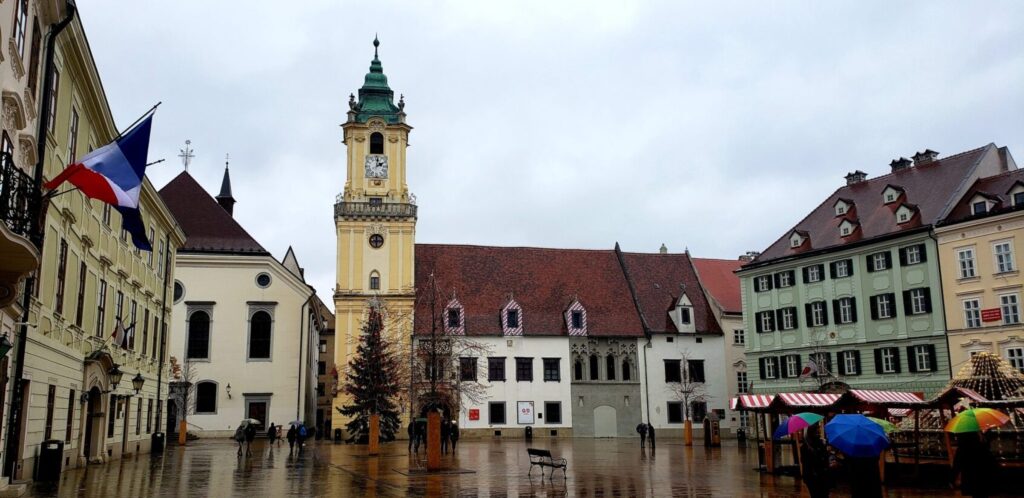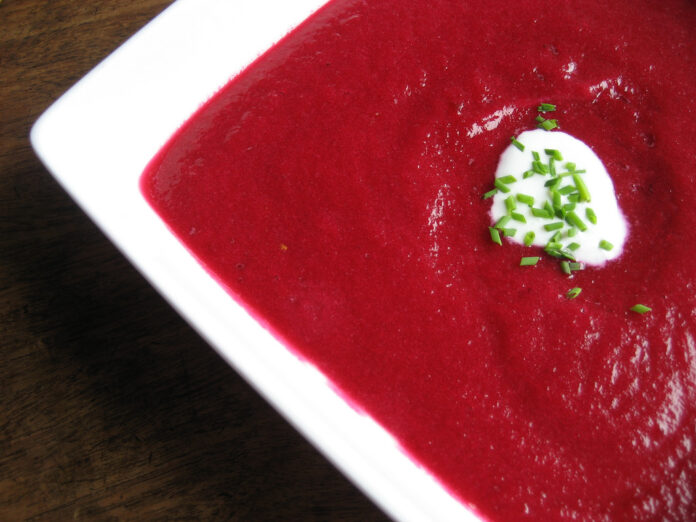we were doing more than simply eating—we were being fed.
Borscht Soup & The Taste of Home
On my recent solo trip to Europe, I found myself wandering along uneven cobblestone streets in the Old Town of Bratislava. I had never been to the Slovak Republic before, and I didn’t know the language. The afternoon hung heavy with dark clouds, and a light rain had settled in. I was cold and hungry, so when I saw a restaurant that had a sign in the window saying, “Slovak food,” I ducked inside.
The dimly lit room had wall-to-wall tables made of heavy dark wood. I held up my index finger, a form of rudimentary traveler charades that I was by now used to playing. There was a waiter carrying bowls of steaming soup and he pointed to a chair at one of the tables near the door.
I looked over the menu and ordered “Sour Cabbage Soup,” spaetzle, and stroganoff. The soup came right away and smelled delicious. I was a little surprised to see that it was borscht soup, complete with a dollop of cream on top. I hadn’t eaten borscht soup much outside of my own family, and never outside of North Dakota, where I had grown up.
I slurped up the hot soup, burning my throat and inhaling the tangy scent. The tastes transported me like I had never before experienced. I had blurry visions in my mind of my own mother, grandmother, and even great grandmothers whose borscht soup I used to slurp up on cold days in North Dakota. Borscht soup that tasted exactly like this.
All of those women are gone now, and I hadn’t tasted their borscht soup in years. I thought of each of them, wanting the soup to
Three tourists from Germany sat down to share my table and they asked about the food. I was pulled from my reverie as I turned to them and asked, “Have you ever tasted home in a place you’ve never been before? It’s very disorienting.”
One said, “There is nothing like the taste of home.” I smiled and nodded. I couldn’t begin to explain anything more.

I had finally traveled far enough to reach the food of my ancestors, who were Germans from Russia. The Germans from Russia were a rather nomadic group who migrated to Russia from Germany for free farmland in the south under the rule of Catherine the Great. Most of these Germans stayed a generation or less, and then fled as the political tide turned and Russia no longer wanted the German immigrants. Some returned to Germany, some went to Canada, and some to the US. Many of those who didn’t get out were sent to Siberia.
The Germans from Russia maintained the German language and much of the culture, but certain aspects (like borscht soup recipes) emerged while living in Russia and delineated these Germans from those who hadn’t left Germany. It is the reason why I don’t recognize German food when I visit Germany, but when I reached Slovakia that cold winter day, the “traditional Slovakian” restaurant smelled and tasted like home.
In all of my travels, I have only once gone to visit relatives. When I was in college, I lived in Germany for a summer and I visited my great grandmother’s youngest sister and her daughter who lived near Stuttgart. They told me stories of my family—these Germans who had been born in Russia and had come back when they were driven out—they told me how my great grandmother boarded a ship alone at the age of twelve to travel to the US where she was adopted by their father’s brother and his wife. They told me stories of how the brothers in the family were taken to Siberia, where they presumably died. One older brother had married and had a family in Russia, the younger brothers were never heard from again.
For all that we inherit in our families—the trauma and the chaos—the simple ritual of sharing familiar food connects us through time and space. If any of the women of my family had been alive the day I was in Bratislava, if any of them had sat with me eating that hot borscht soup, we would have shared a smile knowing we were doing more than simply eating—we were being fed.
Featured image by foodista via flickr
Read more of Melanie’s work at shoesofanomad.com
Read More…
A WOMAN, HER DOG & THE PACIFIC CREST TRAIL
A WOMAN & THE WILD: MESSY AND RELENTLESS GRIEF
HAWAIIAN PIDGIN: SELF-ACCEPTANCE & MY NATIVE TONGUE




